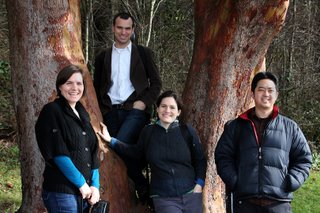The music of Ludwig van Beethoven is on the Jupiter Quartet’s mind these days. The group will be doing its first complete Beethoven cycle this summer at the Aspen Music Festival, so in the words of cellist Daniel McDonough, “we have been in training all year.”
That training consists mainly in including one or two Beethoven quartets on the ensemble’s programs, frequently in a pairing that juxtaposes an early and a late work. And two Beethoven quartets will be on the program when the Jupiter comes to Libby Gardner Concert Hall on April 12 to close out the Chamber Music Society of Salt Lake City’s season.
McDonough and his colleagues will be playing Beethoven’s A major Quartet, op. 18, no. 5, and also the towering C sharp minor Quartet, op. 131. “We have been exploring these pairings of early and late quartets throughout the season,” because it serves “as an excellent illustration of just how dramatically Beethoven’s voice shifted from the beginning to the end of his creative life.”
In an e-mail to Reichel Recommends McDonough explained that the Jupiter likes putting the A major and C sharp minor Quartets together on the same program because there is a connection between the two. “The slow movements are both in the form of theme and variations.” And McDonough considers the one in the A major Quartet to be “one of the most beautiful of the early slow movements. Beethoven composes the simplest of tunes and weaves a very colorful set of variations out of it.”
While the six works that make up the op. 18 set clearly have roots in the classical period, the late quartets look to the future and McDonough believes that the C sharp minor Quartet is the most “creatively liberated” of the 16 quartets, partly because Beethoven wrote it without being commissioned. With the possible exception of the Grosse Fuge, the C sharp minor stands out “as one of his boldest forays in the form.” Each of the seven movements are played without a pause and that makes the work much more cohesive as a whole. “While there is a diversity of emotional character, Beethoven does a masterful job of subtly integrating the material so that there is a thread pulling the listener through the work.”
In stark contrast to these two works, the Jupiter has also programmed György Kurtág’s Twelve Microludes, a work of utter brevity that brings to mind Anton Webern’s concisely constructed pieces. Kurtág once said that “one note was almost enough for him to express everything he needed in music,” McDonough wrote. “Of course, there is more that just one note in these works, but the sentiment is an accurate one.”
As if to underscore this thought, Kurtág bases each movement on one note of the chromatic scale, beginning with low C and moving up by half steps to B. While this kind of structuring might seem to severely limit the composer in terms of expression, McDonough wrote that the opposite is, in fact, the case. “There is a rich palette of sound color and emotion throughout.”
McDonough and his colleagues (violinists Nelson Lee and Meg Freivogel and violist Liz Freivogel) founded the Jupiter Quartet in 2001. McDonough, Lee and Meg Freivogel met as students at the Cleveland Institute of Music, and not long after that the group formed with the addition of Meg’s sister, Liz Freivogel. McDonough and Meg Freivogel had been dating for about a year before the quartet was established, and four years ago they got married. “It’s very lovely, especially for a job that takes you on the road so much, to get to travel with your wife,” McDonough wrote.
How did the foursome decide to call themselves the Jupiter Quartet? McDonough has a simple and logical explanation. “When we formed, Jupiter was the brightest planet in the sky. Also, the astrological symbol for the planet resembles a four. But mostly, we just liked the connotations and the sound of the name.”
With the success the foursome has enjoyed in its first 10 years together, what does the next decade look like? “We feel very lucky to have these wonderful opportunities to tour the world and play this great music,” McDonough wrote. “At the same time, we are equally passionate about teaching….We would like to find a university that shares our commitment to the tradition of this kind of music-making, some place where we can develop a meaningful relationship with a community but continue to share this music with audiences all over.”
CONCERT INFO:
Location: Libby Gardner Concert Hall, University of Utah
Time and Date: 7:30 p.m. April 12
Tickets: $25 general, $5 students
Phone: 801-561-3999
Web: www.cmsofslc.org
ALSO: Pre-concert lecture by Ardean Watts, Room 270, David Gardner Hall, 6:45 p.m., April 12, free.
ALSO: Master Class by Jupiter Quartet, Thompson Chamber Music Hall, David Gardner Hall, 12 p.m., April 12, free and open to the public.


So excited to hear this concert!
Pingback: Musical Crew - Winners of 2011 Beethoven Piano Competition